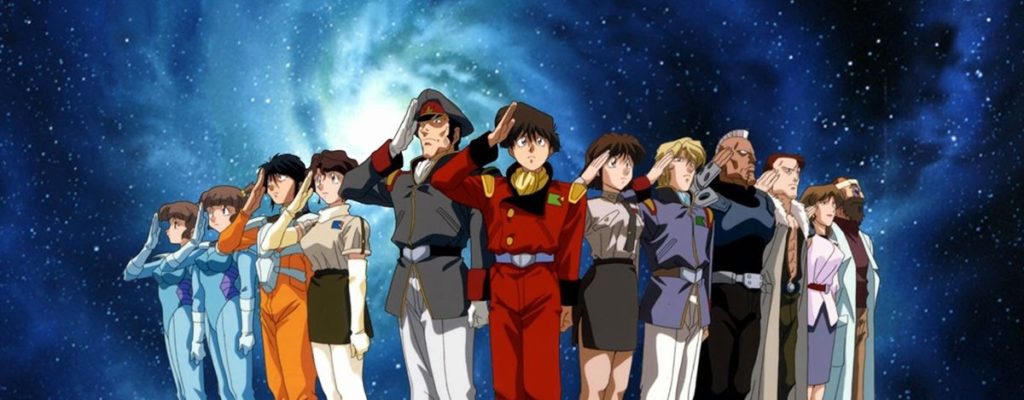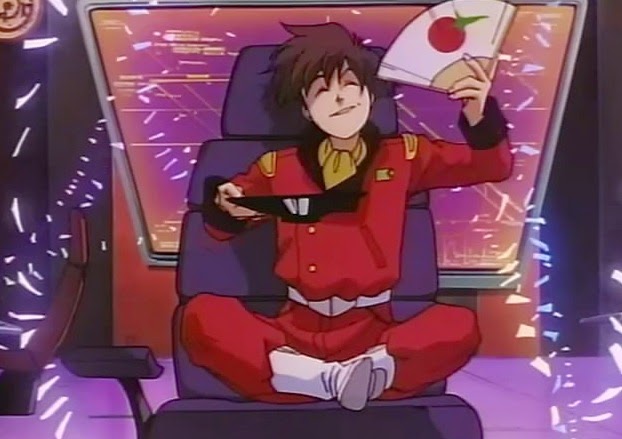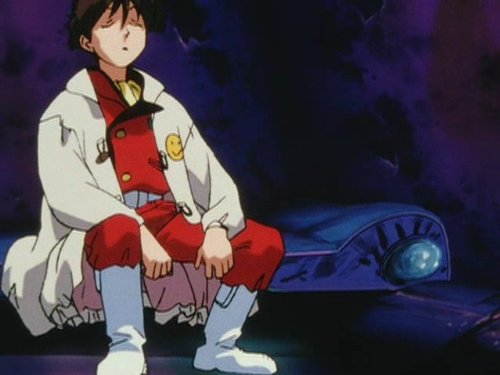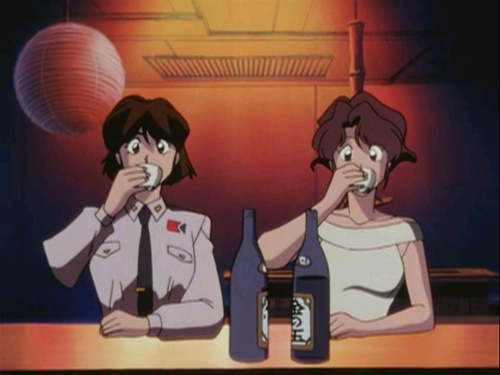Irresponsible Captain Tylor
May 2, 2023 · 0 comments
By Andrew Osmond.

The comedy-space series The Irresponsible Captain Tylor has a puzzle at its core, one that’s summed up very well by a 1970s Doctor Who story. In that serial, two characters are discussing the infuriating title hero. Played by a long-scarfed Tom Baker, he’s crazy and shambolic, yet has a weird knack for vanquishing his enemies. “I don’t think he’s as stupid as he seems,” one character comments. “Darling,” the other replies, “nobody could be as stupid as he seems…”
That’s equally true of Captain Tylor’s titular hero. We meet him hunched and homeless in the rain in a Blade Runner-style city, before he sees the kind of giant advert that was all over Blade Runner – a pretty girl enticing Tylor to get up and join the United Planets Space Force. It’s a typical space opera scenario. Humanity is on the brink of war with an alien power bloc, the Raalgon Empire, and both sides are building up their arsenals like the Federation and Klingons in Cold War Star Trek. Like the Klingons, the Raalgon Empire is made up of human-like warriors in exotic garb, led by a determined princess who’ll be important to the story.
Tylor wanders into the middle of all this. He tells a bemused recruiter that his reasons for joining the space force are nothing to do with defending Earth; he wants an easy job, free food and a uniform, all rent-free. Within minutes of entering the UPSF headquarters, he’s driven a computer so crazy that he destroys the A.I. system and triggers a space war. Before much longer, he’s become captain of his own space vessel – albeit the worst spaceship Earth has, whose crew is, to quote another space opera, a wretched hive of scum and villainy. Joining him is a couple of serious space officers, aghast at this nitwit taking them into battle…

Does Tylor settle down and follow the rules now he’s captain? Of course not. If he’s not “ordering” his rabble of a crew to do whatever they like, then he’s giving commands to run away from battle, or surrender to the enemy unconditionally. Is Tylor just a nitwit? Is he mostly a nitwit? Might he be an idiot savant? Might he even be a genius, putting on a bumbling Clark Kent act 24/7? All these options are on the table, and the people around Tylor swing from one to another.
Among Tylor’s companions are Yuriko, a dedicated female officer on his ship, the Soyokaze, who’s often on the verge of giving Tylor a slap – and sometimes she can’t stop herself. Her funnier male counterpart is Lieutenant Yamamoto, who has a face like a cross bloodhound or a frustrated cop. He often recalls Inspector Zenigata in the Lupin franchise, who also played off a hyper-eccentric lead character. Also in the cast is a dipsomaniac ship’s doctor; the below-deck crew includes a guy called Jason with a hockey mask and chainsaw; and Tylor’s military superiors, desperate to get rid of their loose cannon captain as soon as possible. Need we say their assassination bids backfire?
In comedy, Tylor prompts comparisons to Inspector Clouseau in the Pink Panther films, while his cheerful, daffy demeanour isn’t far from a later anime eccentric, Akira in Eden of the East. Actually, Tylor’s inspiration goes back to 1962, and a live-action Japanese comedy film called Japan’s Irresponsible Age. To quote the Anime Encyclopedia, “This popular satire on Japan’s salaryman culture featured a feckless individual who always managed to come out on top, advancing up promotional ladders when accidents befall his superiors, or lucking into important business information simply by malingering and goofing off.”

It’s interesting that Tylor has a non-SF inspiration, because Irresponsible Captain Tylor feels different from a lot of SF comedy, which is often cynically dark-hearted. Tylor’s first moments recall the 1964 book Bill the Galactic Hero by Harry Harrison, about a man who’s drafted into a monstrous space military, has a run of accidental successes like Tylor, but is unremittingly stupid and selfish.
Many other space comedies have a similar snideness, especially on screen – Dark Star, Red Dwarf, Futurama, Rick and Morty and the anime Space Dandy. Captain Tylor stands out because it develops into something warmer. We may not be sure if Tylor is stupid or clever, but either way, he’s a nice person. Rather than cynicism, Tylor’s humour is rooted in pure daffiness – there’s a lovely sequence which could be from The Pink Panther when a spy tries repeatedly to bump off Tylor with everything from falling scaffolding to poisoned sugar, only to infuriatingly fail each time. Clouseau would have probably killed the spy by accident without realising; Tylor’s resolution is softer hearted.
Like other anime space comedies of the 1990s – Nadesico, Outlaw Star – Tylor has a straight story under the silliness. In 1999, Neil Nadelman, who translated the subtitles for the American edition of Tylor, discussed the series in the magazine Animefantastique. “If it was just the wacky adventures of Tylor all the time, the audience would probably get bored with it fairly quickly. In any other series, this would be a deadly serious story as two large, interstellar empires are about to declare war on each other…Yet Tylor is just this wacky character wandering around in there, defying all the odds and saving the day when nobody believes anybody can do that.”

As translator, Nadelman found Tylor’s humour mostly universal, though he acknowledged the moments of tricky wordplay. He cites one episode where Tylor’s ship is in danger of being demoted. “(Tylor) says, Sasen nada sasen! which literally translates as ‘I won’t allow them to demote us’; the problem is he’s also cracking an incredibly bad pun.” The best Nadelman could do in translation was, “This drop I’ll stop!” The drunk doctor Kitaguchi loves a brand of sake called Kin no Tama, which means “Golden Jewel” but sounds amusingly like kintama, or testicle. In Nadelman’s version, the name is modified to “Golden Family Jewels,” for obvious reasons.
Tylor was first introduced in 1989 in a book by SF writer Hitoshi Yoshioka; this grew into a huge series, with side-stories and spinoffs. The 1993 TV anime was made by the already-venerable Tatsunoko studio, which had begun in the 1960s. Made toward the end of the age of cel animation, Tylor’s gorgeous visuals hold up remarkably, with their rich colours and designs; the lack of digital effects enhances the charm of Tylor’s future.
The series was directed by a significant industry name, Koichi Mashimo. He’d worked on “straight” SF anime, directing Gatchaman II and Gatchaman Fighter in the 1970s – these were Tatsunoko’s sequels to the original Gatchaman, which had been adapted in the West as Battle of the Planets. Mashimo moved on to funnier SF, directing the film Dirty Pair: Project Eden and the first Dominion Tank Police video series. Following Tylor, Mashimo founded the Bee Train studio and helmed several of its .hack cyberspace series.
Andrew Osmond is the author of 100 Animated Feature Films. Irresponsible Captain Tylor is released in the UK by Anime Limited.
Leave a Reply